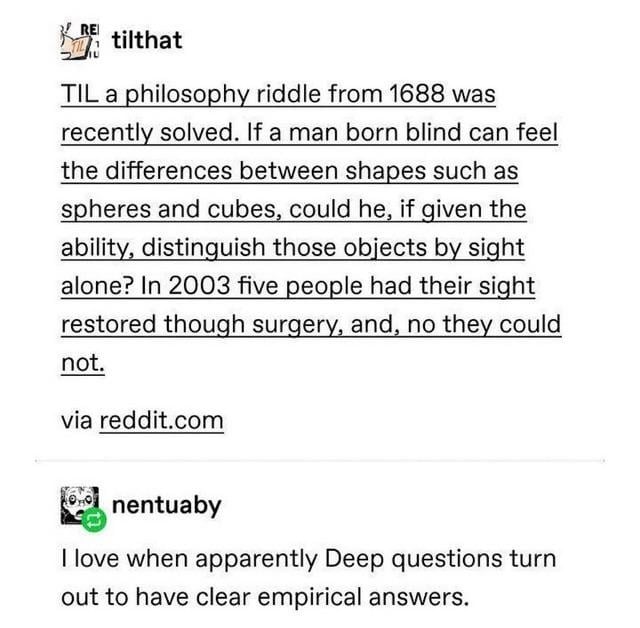this post was submitted on 21 Oct 2023
1046 points (98.5% liked)
Microblog Memes
6106 readers
3032 users here now
A place to share screenshots of Microblog posts, whether from Mastodon, tumblr, ~~Twitter~~ X, KBin, Threads or elsewhere.
Created as an evolution of White People Twitter and other tweet-capture subreddits.
Rules:
- Please put at least one word relevant to the post in the post title.
- Be nice.
- No advertising, brand promotion or guerilla marketing.
- Posters are encouraged to link to the toot or tweet etc in the description of posts.
Related communities:
founded 2 years ago
MODERATORS
you are viewing a single comment's thread
view the rest of the comments
view the rest of the comments

Philosophy was thought to be the understanding of fundamental truths more real than reality, but a lot of it was simply developing constructs that help us understand the world and survive. Even if we find a theory of everything that can mathematically describe the fundamental rules of the universe and existence, that might simply be a construct we use to help us understand the actual rules. It would be the closest thing to a form that would be more real than the material world, but it might only be an image of it.
Most philosophers didn't believe that we could be machines without an immaterial soul, but as we learn more about the brain and body, the things that can't be better explained by material mechanisms dwindles. I don't know for sure that there isn't a human soul, but if it does exist, it will probably never be detectable. I don't think it should change how we decide to live, as we should live well even if there is no afterlife.
Unless we all die, science will probably discover every rule and emergent principle that can be discovered. We'll never have every specific detail and account of our surroundings, but we'll be able to infer how our observations likely came about.
Science is a branch of philosophy
True. Science allows us to change and refine our assumptions by giving us an increasingly accurate image of reality. The other branches of philosophy can help us process and use that information, as science has no inherent direction.
Guess where the title PhD comes from.